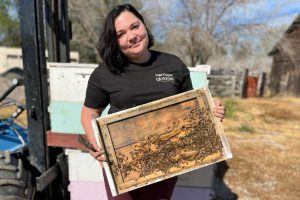Civil Eats TV: Let Them Bee
‘To save ourselves, we have to save the bees’: Caroline Yelle is breeding queen honey bees to survive the changing climate and multiple other threats.

Caroline Yelle
When the lightning-sparked Hennessey Fire, part of the LNU Lightning Complex Fire, swept through rural Vacaville, California, in August 2020, queen bee breeder and beekeeper Caroline Yelle thought she had lost her entire business.
“The fire destroyed everything in its path: the bees, my hives, the whole farm,” says the 29-year-old owner of Pope Canyon Queens (PCQ), who lost more than 400 hives. But out of the ashes, Yelle—and a new set of bees—have risen. “It was a huge bump in the road for us, but it has allowed us to do better.”

The aftermath of the LNU Complex Fire. (Photo courtesy of Caroline Yelle)
Now, almost two years later, and thanks to the support of her community, Yelle is back to breeding queens. She works with Carniolans, or Apis mellifera carnica, a hybrid she selected back home in Canada and reproduces in California in hopes that their genetic strengths can make them resilient to the many challenges facing honey bees today. Today, she has about 580 hives.
Pollinators, most often honey bees, are responsible for one in every three bites of food we take, and they help increase U.S. crop values by more than $15 billion each year. However, critical honey bee populations have been in serious decline for more than three decades in the U.S. due to high rates of colony loss, which stems from many factors, including habitat loss, decreasing crop diversity, increased use of pesticides and other toxins, climate change, and pests and pathogens. Other factors include industrial beekeeping practices—particularly in the large-scale almond industry.
This year alone, 2 million beehives—containing about 42 billion bees—were brought into the state to pollinate almond blossoms.
“If there are no bees, there is no food,” says Yelle. “To save ourselves, we have to save the bees.”
The U.S. Department of Agriculture considers commercial honeybees to be livestock, due to their crucial role in food production. However, more bees die every year in the U.S. than all other animals raised for slaughter combined; during the winter of 2020–21, an estimated 32 percent of managed colonies in the U.S. were lost.
‘Give Bees a Chance’
In 2018, Yelle purchased PCQ from her mentor and business partner,….
To read the whole article go to;






